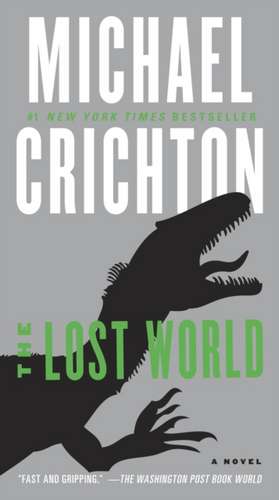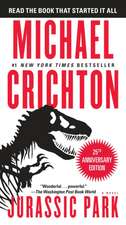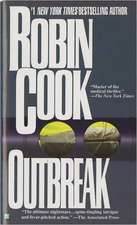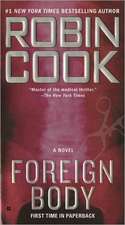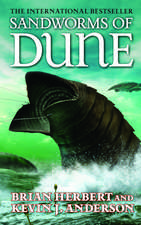The Lost World
Autor Michael Crichtonen Limba Engleză Paperback – 29 oct 2012
#1 NEW YORK TIMES BESTSELLER
“Fast and gripping.”—The Washington Post Book World
It is now six years since the secret disaster at Jurassic Park, six years since the extraordinary dream of science and imagination came to a crashing end—the dinosaurs destroyed, the park dismantled, and the island indefinitely closed to the public.
There are rumors that something has survived. . . .
“Harrowing thrills . . . fast-paced and engaging.”—People
“A very scary read.”—Entertainment Weekly
“Action-packed.”—New York Daily News
“An edge-of-the-seat tale.”—St. Petersburg Times
| Toate formatele și edițiile | Preț | Express |
|---|---|---|
| Paperback (2) | 55.10 lei 22-33 zile | +22.34 lei 6-12 zile |
| CORNERSTONE – 21 mai 2015 | 55.10 lei 22-33 zile | +22.34 lei 6-12 zile |
| BALLANTINE BOOKS – 29 oct 2012 | 62.86 lei 3-5 săpt. |
Preț: 62.86 lei
Nou
Puncte Express: 94
Preț estimativ în valută:
12.03€ • 12.86$ • 10.03£
12.03€ • 12.86$ • 10.03£
Carte disponibilă
Livrare economică 27 martie-10 aprilie
Preluare comenzi: 021 569.72.76
Specificații
ISBN-13: 9780345538994
ISBN-10: 0345538994
Pagini: 416
Dimensiuni: 104 x 188 x 30 mm
Greutate: 0.24 kg
Editura: BALLANTINE BOOKS
ISBN-10: 0345538994
Pagini: 416
Dimensiuni: 104 x 188 x 30 mm
Greutate: 0.24 kg
Editura: BALLANTINE BOOKS
Notă biografică
Michael Crichton’s novels include The Andromeda Strain, The Great Train Robbery, Congo, Jurassic Park, Rising Sun, Disclosure, and The Lost World. He was as well the creator of the television series ER. Crichton died in 2008.
Extras
The Lost World: Story Excerpt ~ Diego
In places, the Jeep track was hardly recognizable, so thickly had the jungle grown back. Clearly, no one had used this road for many years, and the jungle was always ready to return.
Behind him, Diego grunted, swore softly. Levine turned and saw Diego lifting his foot gingerly; he had stepped to mid-ankle in a pile of green animal-droppings. Levine went back.
Diego scraped his boot clean on the stem of a fern. The droppings appeared to be composed of pale flecks of hay, mixed with green. The material was light and crumbly - dried, old. There was no smell.
Levine searched the ground carefully, until he found the remainder of the original spoor. The droppings were well formed, twelve centimeters in diameter. Definitely left behind by some large herbivore.
Diego was silent, but his eyes were wide.
Levine shook his head, continued on. As long as they saw signs of herbivora, he wasn't going to worry. At least, not too much. Even so, his fingers touched the butt of his pistol, as if for reassurance.
They came to a stream, muddy banks on both sides. Here Levine paused. He saw clear three-toed footprints in the mud, some of them quite large. The palm of his own hand, fingers spread wide, fitted easily inside one of the prints, with room to spare.
When he looked up, Diego was crossing himself again. He held the rifle in his other hand.
They waited at the stream, listening to the gentle gurgle of the water. Something shiny glinted in the stream, catching his eye. He bent over, and plucked it out. It was a piece of glass tubing, roughly the size of a pencil. One end was broken off. There were graduated markings along the side. He realized it was a pipette, of the kind used in laboratories everywhere in the world. Levine held it up to the light, turning it in his fingers. It was odd, he thought. A pipette like this implied-
Levine turned, and caught a glimpse of movement out of the corner of his eye. Something small and brown, scurrying across the mud of the riverbank. Something about the size of a rat.
Diego grunted in surprise. Then it was gone, disappearing in foliage.
Levine moved forward and crouched in the mud by the stream. He peered at the footprints left by the tiny animal. The footprints were three-toed, like the tracks of a bird. He saw more three-toed tracks, including some bigger ones, which were several inches across.
Levine had seen such prints before, in trackways such as the Purgatoire River in Colorado, where the ancient shoreline was now fossilized, the dinosaur tracks frozen in stone. But these prints were in fresh mud. And they had been made by living animals.
Sitting on his haunches, Levine heard a soft squeak coming from somewhere to his right. Looking over, he saw the ferns moving slightly. He stayed very still, waiting.
After a moment, a small animal peeked out from among the fronds. It appeared to be the size of a mouse; it had smooth, hairless skin and large eyes mounted high on its tiny head. It was greenish-brown in color, and it made a continuous, irritable squeaking sound at Levine, as if to drive him away. Levine stayed motionless, hardly daring to breathe.
He recognized this creature, of course. It was a mussaurus, a tiny prosauropod from the Late Triassic. Skeletal remains were found only in South America. It was one of the smallest dinosaurs known. A dinosaur, he thought.
Even though he had expected to see them on this island, it was still startling to be confronted by a living, breathing member of the Dinosauria. Especially one so small. He could not take his eyes off it. He was entranced. After all these years, after all the dusty skeletons - an actual living dinosaur!
The little mussaur ventured farther out from the protection of the fronds. Now Levine could see that it was longer than he had thought at first. It was actually about ten centimeters long, with a surprisingly thick tail. All told, it looked very much like a lizard. It sat upright, squatting on its hind legs on the frond. He saw the rib cage moving as the animal breathed. It waved its tiny forearms in the air at Levine, and squeaked repeatedly.
Slowly, very slowly, Levine extended his hand.
The creature squeaked again, but did not run. If anything it seemed curious, cocking its head the way very small animals do, as Levine's hand came closer.
Finally Levine's fingers touched the tip of the frond. The mussaur stood on its hind legs, balancing with its outstretched tail. Showing no sign of fear, it stepped lightly onto Levine's hand, and stood in the creases of his palm. He hardly felt the weight, it was so light. The mussaur walked around, sniffed Levine's fingers. Levine smiled, charmed.
Then, suddenly, the little creature hissed in annoyance, and jumped off his hand, disappearing into the palms. Levine blinked, unable to understand why.
Then he smelled a foul odor, and heard a heavy rustling in the bushes on the other side. There was a soft grunting sound. More rustling. For a brief moment, Levine remembered that carnivores in the wild hunted near streambeds, attacking animals when they were vulnerable, bending over to drink. But the recognition came too late; he heard a terrifying high-pitched cry, and when he turned he saw that Diego was screaming as his body was hauled away, into the bushes. Diego struggled; the bushes shook fiercely; Levine caught a glimpse of a single large foot, its middle toe bearing a short curving claw. Then the foot pulled back. The bushes continued to shake.
Suddenly, the forest erupted in frightening animal roars all around him. He glimpsed a large animal charging him. Richard Levine turned and fled, feeling the adrenaline surge of pure panic, not knowing where to go, knowing only that it was hopeless. He felt a heavy weight suddenly tear at his backpack, forcing him to his knees in the mud, and he realized in that moment that despite all his planning, despite all his clever deductions, things had gone terribly wrong, and he was about to die.
In places, the Jeep track was hardly recognizable, so thickly had the jungle grown back. Clearly, no one had used this road for many years, and the jungle was always ready to return.
Behind him, Diego grunted, swore softly. Levine turned and saw Diego lifting his foot gingerly; he had stepped to mid-ankle in a pile of green animal-droppings. Levine went back.
Diego scraped his boot clean on the stem of a fern. The droppings appeared to be composed of pale flecks of hay, mixed with green. The material was light and crumbly - dried, old. There was no smell.
Levine searched the ground carefully, until he found the remainder of the original spoor. The droppings were well formed, twelve centimeters in diameter. Definitely left behind by some large herbivore.
Diego was silent, but his eyes were wide.
Levine shook his head, continued on. As long as they saw signs of herbivora, he wasn't going to worry. At least, not too much. Even so, his fingers touched the butt of his pistol, as if for reassurance.
They came to a stream, muddy banks on both sides. Here Levine paused. He saw clear three-toed footprints in the mud, some of them quite large. The palm of his own hand, fingers spread wide, fitted easily inside one of the prints, with room to spare.
When he looked up, Diego was crossing himself again. He held the rifle in his other hand.
They waited at the stream, listening to the gentle gurgle of the water. Something shiny glinted in the stream, catching his eye. He bent over, and plucked it out. It was a piece of glass tubing, roughly the size of a pencil. One end was broken off. There were graduated markings along the side. He realized it was a pipette, of the kind used in laboratories everywhere in the world. Levine held it up to the light, turning it in his fingers. It was odd, he thought. A pipette like this implied-
Levine turned, and caught a glimpse of movement out of the corner of his eye. Something small and brown, scurrying across the mud of the riverbank. Something about the size of a rat.
Diego grunted in surprise. Then it was gone, disappearing in foliage.
Levine moved forward and crouched in the mud by the stream. He peered at the footprints left by the tiny animal. The footprints were three-toed, like the tracks of a bird. He saw more three-toed tracks, including some bigger ones, which were several inches across.
Levine had seen such prints before, in trackways such as the Purgatoire River in Colorado, where the ancient shoreline was now fossilized, the dinosaur tracks frozen in stone. But these prints were in fresh mud. And they had been made by living animals.
Sitting on his haunches, Levine heard a soft squeak coming from somewhere to his right. Looking over, he saw the ferns moving slightly. He stayed very still, waiting.
After a moment, a small animal peeked out from among the fronds. It appeared to be the size of a mouse; it had smooth, hairless skin and large eyes mounted high on its tiny head. It was greenish-brown in color, and it made a continuous, irritable squeaking sound at Levine, as if to drive him away. Levine stayed motionless, hardly daring to breathe.
He recognized this creature, of course. It was a mussaurus, a tiny prosauropod from the Late Triassic. Skeletal remains were found only in South America. It was one of the smallest dinosaurs known. A dinosaur, he thought.
Even though he had expected to see them on this island, it was still startling to be confronted by a living, breathing member of the Dinosauria. Especially one so small. He could not take his eyes off it. He was entranced. After all these years, after all the dusty skeletons - an actual living dinosaur!
The little mussaur ventured farther out from the protection of the fronds. Now Levine could see that it was longer than he had thought at first. It was actually about ten centimeters long, with a surprisingly thick tail. All told, it looked very much like a lizard. It sat upright, squatting on its hind legs on the frond. He saw the rib cage moving as the animal breathed. It waved its tiny forearms in the air at Levine, and squeaked repeatedly.
Slowly, very slowly, Levine extended his hand.
The creature squeaked again, but did not run. If anything it seemed curious, cocking its head the way very small animals do, as Levine's hand came closer.
Finally Levine's fingers touched the tip of the frond. The mussaur stood on its hind legs, balancing with its outstretched tail. Showing no sign of fear, it stepped lightly onto Levine's hand, and stood in the creases of his palm. He hardly felt the weight, it was so light. The mussaur walked around, sniffed Levine's fingers. Levine smiled, charmed.
Then, suddenly, the little creature hissed in annoyance, and jumped off his hand, disappearing into the palms. Levine blinked, unable to understand why.
Then he smelled a foul odor, and heard a heavy rustling in the bushes on the other side. There was a soft grunting sound. More rustling. For a brief moment, Levine remembered that carnivores in the wild hunted near streambeds, attacking animals when they were vulnerable, bending over to drink. But the recognition came too late; he heard a terrifying high-pitched cry, and when he turned he saw that Diego was screaming as his body was hauled away, into the bushes. Diego struggled; the bushes shook fiercely; Levine caught a glimpse of a single large foot, its middle toe bearing a short curving claw. Then the foot pulled back. The bushes continued to shake.
Suddenly, the forest erupted in frightening animal roars all around him. He glimpsed a large animal charging him. Richard Levine turned and fled, feeling the adrenaline surge of pure panic, not knowing where to go, knowing only that it was hopeless. He felt a heavy weight suddenly tear at his backpack, forcing him to his knees in the mud, and he realized in that moment that despite all his planning, despite all his clever deductions, things had gone terribly wrong, and he was about to die.
Descriere
Crichton's thrilling #1 "New York Times" bestsellerNthe exciting follow-up to his blockbuster "Jurassic Park"Nis now available in a tall Premium Edition. Reissue.
